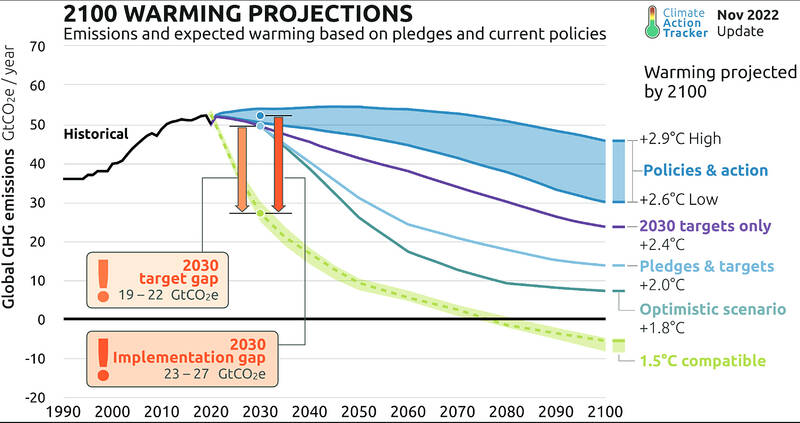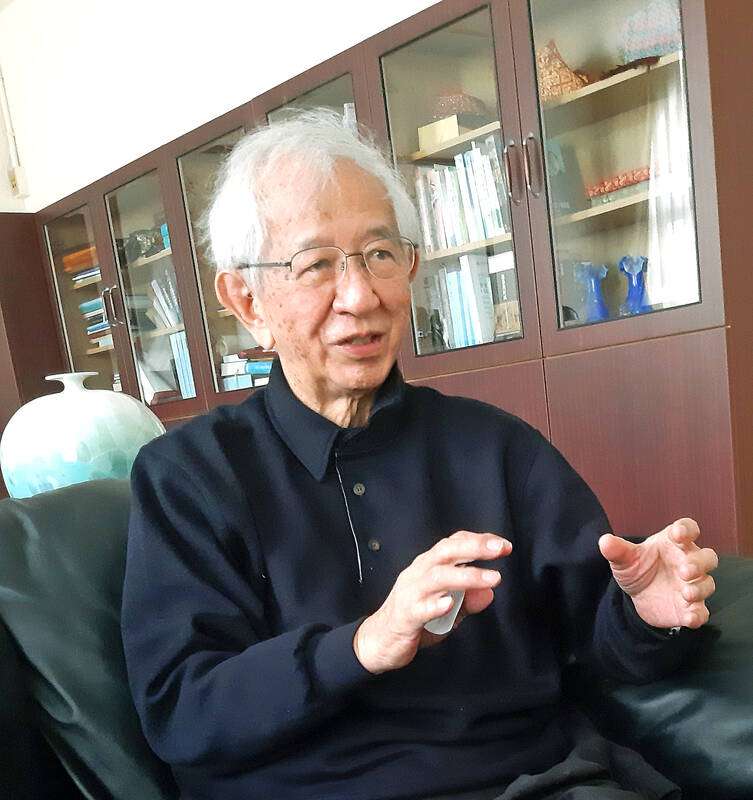“Before the end of the century, if we do not learn to operate as one community for the entire world, I think the chances of humanity to survive on Earth will be very, very small,” Taiwanese scientist Lee Yuan-tseh (李遠哲) said in 2005, calling for a change in the way humanity uses energy.
Eighteen years on, not only are the cautionary words more relevant, for Lee, there is a pressing need to communicate the effects of global warming as he spoke of Taiwan’s progress — or lack thereof — in implementing efficient energy policies and accelerating the deployment of renewable energy to tackle the climate crisis.
“The government’s energy policy is full of faults,” Lee said in an interview with the Taipei Times late last month, lamenting that the “tepid” climate plan drafted by President Tsai Ing-wen’s (蔡英文) administration has failed to consider future generations.

Photo courtesy of Climate Action Tracker
A UN online statement on climate action says: “To avert the worst impacts of climate change and preserve a livable planet, global temperature increase needs to be limited to 1.5°C above pre-industrial levels,” adding that Earth is about 1.1°C warmer than in the late 1800s, and emissions continue to rise.
As a member of the global village, Taiwan has joined the call to cut carbon emissions to net zero by 2050, a goal the UN bills as “this century’s global imperative.”
In addition to a 2050 deadline for carbon neutrality set in the Climate Change Adaptation Act (氣候變遷因應法) last month, the government in December last year also said that Taiwan by 2030 would reduce emissions by about 25 percent from 2005 levels.

Photo: Huang Tai-lin, Taipei Times
Although that target betters a previous benchmark of 20 percent, it pales in comparison with two industrialized neighbors.
Japan in 2021 revised its climate plan to a more ambitious target to reduce greenhouse gas emissions by 46 to 50 percent from 2013 levels by 2030. South Korea also accelerated efforts to reach carbon neutrality by 2050, with a commitment to reduce carbon emissions by 40 percent from 2018 levels by 2030.
“The path of progress [Taiwan] is taking is not good, which is evidenced by having so far failed to set an ambitious target to reduce greenhouse gas emissions,” Lee said.
“The 2030 goal set by the government means we are still far behind 25 percent. It said it would ‘make up’ for the remaining figure by 2026, but as of now, we are already lagging behind,” Lee said. “How could you get there in three years?”
In the “Taiwan Pathway to Net Zero Emissions in 2050” strategy unveiled by the National Development Council on Dec. 28, the government seeks to have renewable energy account for 27 to 30 percent of the nation’s energy mix by 2030, with coal accounting for 20 percent and liquefied natural gas 50 percent.
The strategy aims to have renewable energy produce about 65 percent of the nation’s energy by 2050, with thermal power comprising about 24 percent, hydrogen power about 10 percent and hydroelectric power 1 percent.
Thermal power generation (including coal, gas and oil-fired power generation) comprised 79.6 percent of the nation’s electricity production in 2021, with renewable energy sources at 6.3 percent, pumped-storage hydroelectricity 1.3 percent and nuclear energy 10.8 percent, data from Taiwan Power Co showed.
Renewable energy sources are expected to make up 10 percent of the nation’s electricity production this year, up from 8.6 percent last year, the Ministry of Economic Affairs’ Bureau of Energy said last month.
Regardless, “much effort is still needed for us to catch up in other areas such as wind and solar energy,” Lee said.
Lee was the first laureate born and educated in Taiwan when he was awarded the 1986 Nobel Prize in Chemistry with Dudley Herschbach and John Polanyi, for their contributions to the development of reaction dynamics.
Lee later served as president of Taiwan’s highest academic research institute, Academia Sinica, from 1994 to 2006, and president of the France-based International Council for Science from 2011 to 2014.
It was during his tenure there that the council, in partnership with the World Federation of Engineering Organizations, contributed research to the 2012 UN Conference on Sustainable Development.
Lee’s efforts to raise awareness on environmental sustainability also led to his selection by the US-based National Academy of Sciences in 2020 as one of 10 laureates featured in a photographic exhibition called Advancing Rights and Freedoms: Science, Human Dignity, and the Nobel Prize.
A key area the Tsai government has overlooked in its net zero framework is economic development, Lee said.
“New factories keep appearing, but you don’t see the government restricting their energy use. Instead it is all talk about bringing in more investment,” Lee said.
“Rampant development keeps swelling, and so is energy consumption,” he added.
Although the government said that projects were developed with some caps on carbon emissions, none of those goals have been reached, he said.
When Taiwan was an agricultural society, “if there was a less than optimal harvest one year, then we’d say ‘let’s eat less,’” Lee said. “The government today lacks such foresight. We should economize and not squander.”
Vice President William Lai (賴清德), who is also the Democratic Progressive Party chairman, has made climate change a central focus of the party’s agenda.
Asked what advice he would share with Lai, Lee said that Taiwan should purchase clean energy from other countries if it cannot produce enough of its own.
Exercising influence over the Executive Yuan via his role as the ruling party chairman, Lai should also direct the government toward revising economic development plans and introducing a carbon tax, starting with large emitters, Lee said.
“As a leader, the most important thing [for Lai] is to have the message reach people’s hearts and let the public realize: ‘This path to act and to seek environmental sustainability is the right direction to go,’” he added.
Lee, who has championed climate issues for decades, believes there is a light at the end of the global-warming tunnel.
“The key lies in each and every individual’s awakening,” he said, adding that communication across all of society is crucial to make the public aware of the urgency.
“I hope for a new wave of awakening, which would be vital for the survival and sustainable development of humankind,” Lee said. “It is our responsibility to hand over a better Earth to future generations.”
This story has been amended since it was first published.

POSITIVE DEVELOPMENT: Japan and the US are expected to hold in-depth discussions on Taiwan-related issues during the meeting next month, Japanese sources said The holding of a Japan-US leaders’ meeting ahead of US President Donald Trump’s visit to China is positive news for Taiwan, former Japan-Taiwan Exchange Association representative Hiroyasu Izumi said yesterday. After the Liberal Democratic Party’s landslide victory in Japan’s House of Representatives election, Japanese Prime Minister Sanae Takaichi is scheduled to visit the US next month, where she is to meet with Trump ahead of the US president’s planned visit to China from March 31 to April 2 for a meeting with Chinese President Xi Jinping (習近平). Japan and the US are expected to hold in-depth discussions on Taiwan-related issues during the

‘LIKE-MINDED PARTNER’: Tako van Popta said it would be inappropriate to delay signing the deal with Taiwan because of China, adding he would promote the issue Canadian senators have stressed Taiwan’s importance for international trade and expressed enthusiasm for ensuring the Taiwan-Canada trade cooperation framework agreement is implemented this year. Representative to Canada Harry Tseng (曾厚仁) in an interview with the Central News Agency (CNA) said he was increasingly uneasy about Ottawa’s delays in signing the agreement, especially as Ottawa has warmed toward Beijing. There are “no negotiations left. Not only [is it] initialed, we have three versions of the text ready: English, French and Mandarin,” Tseng said. “That tells you how close we are to the final signature.” Tseng said that he hoped Canadian Prime Minister Mark Carney

President William Lai (賴清德) yesterday bestowed one of Taiwan’s highest honors on Saint Vincent and the Grenadines (SVG) Ambassador Andrea Clare Bowman in recognition of her contributions to bilateral ties. “By conferring the Order of Brilliant Star with Grand Cordon on Ambassador Bowman today, I want to sincerely thank her, on behalf of the Taiwanese people, for her outstanding contribution to deepening diplomatic ties between Taiwan and SVG,” Lai said at a ceremony held at the Presidential Office in Taipei. He noted that Bowman became SVG’s first ambassador to Taiwan in 2019 and

A man walks past elementary school artworks at the Taipei Lantern Festival in Ximen District yesterday, the first day of the event. The festival is to run from 5pm to 10pm through March 15.